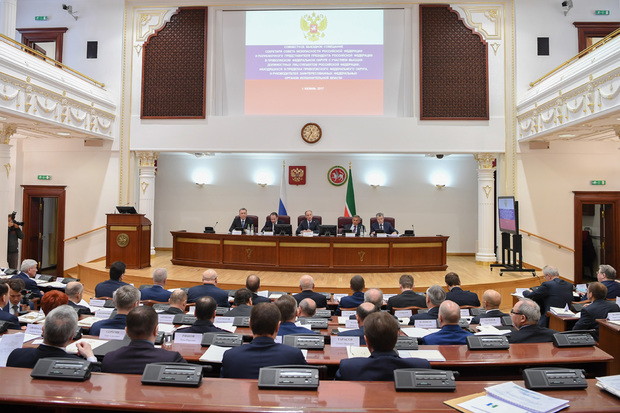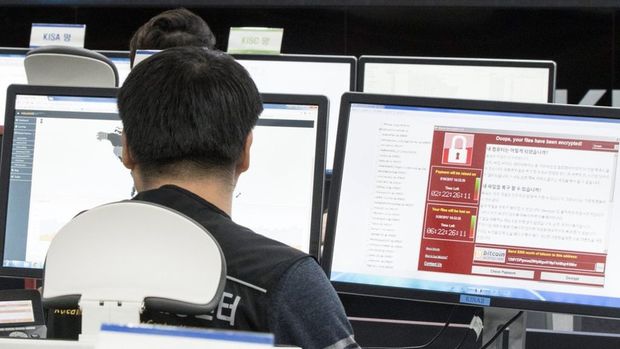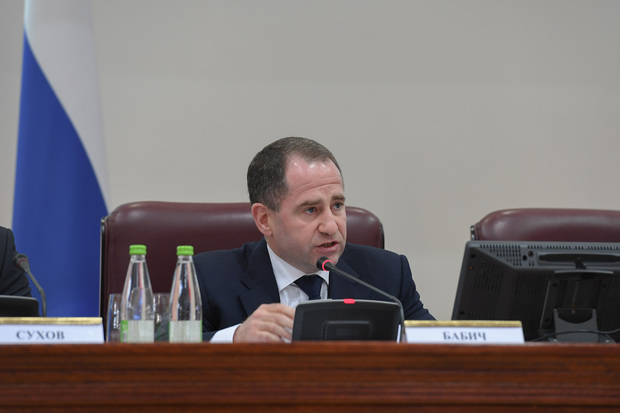Security Council in Kazan: cyber attacks become main topic in Patrushev’s report, protesters taken note of
The joint meeting of Security Council Secretary and Presidential Envoy to the Volga Federal District took place in Kazan: new threats voiced in addition to traditional threats in the form of radical Islamism
A joint meeting of Secretary of the Russian Security Council Nikolai Patrushev and Presidential Envoy of the Volga Federal District Mikhail Babich took place in Kazan. Meetings are held monthly in different cities of Russia. Nikolai Patrushev said that such meetings are particularly relevant in connection with the forthcoming international events — the Confederations Cup, the World Cup and the election cycle 2018, which, as said by Secretary of the Security Council, has already begun. Along with traditional security threats such as terrorism, a new threat was announced — the virus WannaСry, the attack of which has demonstrated that not all Russian authorities are ready to meet the computer enemy.
''Outwardly prosperous citizens are used as delivery means for explosive devices''
The main threat to Russia's national security still comes from international terrorist organizations, on the side of which some Russians are also fighting. Thus, according to Nikolai Patrushev, about 400 residents of the Volga Federal District, recruited by ISIS, are being in Syria. Some of the participants of bandit underground movements prepared crimes. In 2016, the security services prevented terrorist attacks on the territory of Tatarstan, Bashkortostan, Kirov Oblast and Nizhny Novgorod Oblast.
''The form and tactics of terrorist activities are being transformed. Young people, women and families of terrorists and foreign citizens are involved to commit terrorist attacks. People, seemingly completely legalized in the country of stay, outwardly prosperous, are used as means of delivery of explosives,'' said Presidential Envoy in the Volga Federal District Mikhail Babich.

Mikhail Babich: ''Young people, women and families of terrorists and foreign citizens are involved to commit terrorist attacks. People, seemingly completely legalized in the country of stay, outwardly prosperous, are used as means of delivery of explosives''
''The threat of a spread of radical forms of Islam also comes from Russian citizens who received a theological education abroad. The leaders of the so-called Sharia, Salafi enclaves tend to subordinate all aspects of social life to Islamic religious dogma. The basis of the ideologies they disseminate is religious extremism. The proliferation of non-traditional religious movements increases a risk of radicalization of society, especially of religious citizens,'' said Nikolai Patrushev.
According to Mikhail Babich, more than 200 residents of the district went abroad through unofficial channels to obtain a theological education. However, Envoy stated that the danger comes not only from radical Islamic structures.
''There is an intensification of missionary activities of Western religious organizations of Protestant and other directions,'' said Babich.
''We do not have the evidence that the virus attack was committed by security services of a particular country''
Almost the greater part of the speech Nikolai Patrushev devoted to the fight against computer viruses. It is noteworthy that this topic was almost impromptu. According to the press service of Secretary of the Security Council, it was not present in the original text of the report.
According to Patrushev, the attack on May 12-13, when more than 200,000 users in 150 countries suffered due to the malware, has allowed to estimate the quality of solutions for security issues of Internet use in state and municipal authorities adopted in June 2016.

''The information systems partially suffered of those authorities that had not completed the creation in their segments of the system of detection, prevention and elimination of consequences of computer attacks. On the territory of the Volga Federal District the greatest problems arose in Nizhny Novgorod Oblast and Samara Oblast, Tatarstan and the Chuvash Republic. All this allows to conclude that taken in June 2016 decisions have not been fully fulfilled, the work to identify software vulnerabilities is not completed,'' said Nikolai Patrushev.
According to Patrushev, one of the main measures, which will provide immunity against cyber attacks, is the prevention of foreign software procurement for state and municipal needs and the transition to the domestic software.
''Currently we do not have the evidence that the virus attack was committed by security services of a particular country, but it is confirmed that there were used highly skilled professionals. If it was the security services, the consequences would have been much more serious,'' said Secretary of the Security Council.
The next meeting of the Security Council has been decided to devote to that topic.
Ministry of Internal Affairs accused of ineffectiveness in fight against illegal immigrants
Another threat to the national security — illegal migration. Nikolai Patrushev announced that corruption in this sphere exists, in particular, he was aware of the facts of complicity on the part of staff responsible for migration registration, and the police. Last year in this area there was a failure, it is associated with the reorganization of the Federal migration service and the transfer of its functions to the Interior Ministry, suggested Mikhail Babich.

Almost half of all migrants — 385,000 people – come to the territory of the Volga Federal District illegally. Most violators of immigration laws are from Azerbaijan, Moldova, Tajikistan and Uzbekistan.
''With a stable number of migrant workers, there has been a decline in a number of patents granted by almost 13% and a 24% decrease in the issuance of work permits — it says about a partial growth of the shadow sector of the economy,'' said Mikhail Babich.
The main reason, according to Mikhail Babich, is the lack of effectiveness of law enforcement agencies.
There are also gaps in the legislation. Envoy lamented that there have been a number of amendments to the law, but the government has not taken them into account. So, in the fight against illegal immigration will help, according to Mikhail Babich, mandatory fingerprinting of foreign citizens who enter Russia without visa. Liability for organizations providing mediation services for migration registration, the introduction of a minimum marriage term for foreigners in order to avoid fictitious marriages.